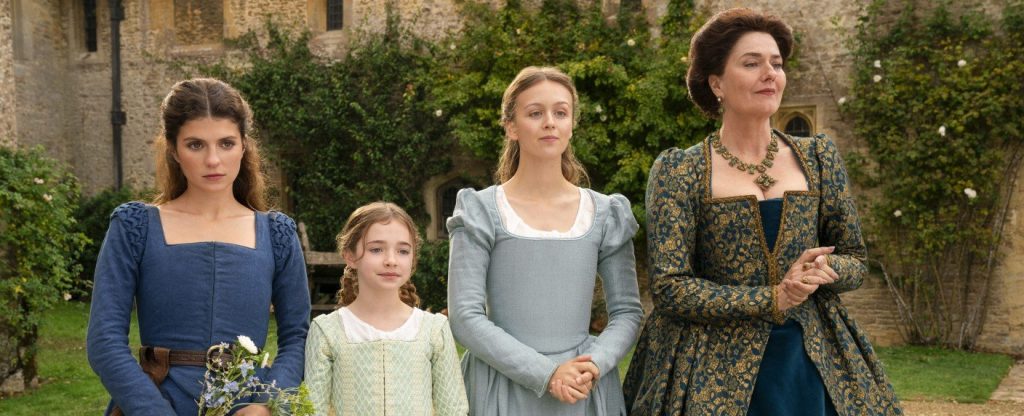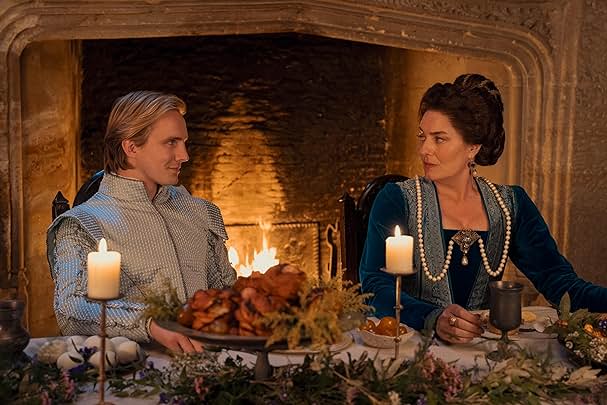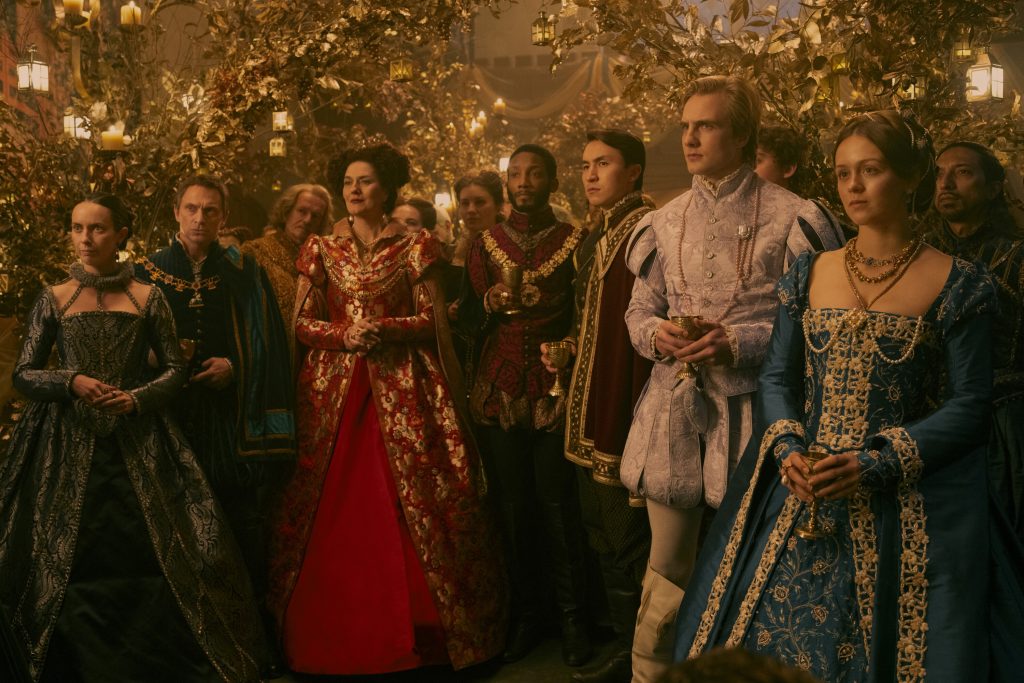
The wonderfully bawdy, purposely historically inaccurate, and utterly hilarious series My Lady Jane looks at a succession war in the Tudor English royal court of 1553. The magnificent Anna Chancellor is Lady Frances Grey, mother of Jane who, in this version is not executed at age 16 but goes on to have a fulfilling, femmetastic life. Chancellor is a hoot, commanding the screen in all her scenes. What She Said’ Anne Brodie spoke with her, had a blast, learned and laughed.
Anne Brodie – I love this series so much because it’s bawdy and goes all the way and doesn’t hold back.
Anna Chancellor – Yeah, it’s quite kind of filthy almost isn’t it?
AB – It is filthy and isn’t it great because it’s done with humor; if it were if it were dead serious it’d be something else altogether, probably wouldn’t be on a streamer, I don’t know.
AC – No, it’s, it’s, they’re funny. The women, the women who’ve written it are so funny. It’s like you’ve gone to work with your best friends.
AB– Tell me about the way the women in the court lived.
AC – Well, Lady Jane Gray in real life was extremely religious and very, very committed. I think it’s so hard for us to understand their relationship with religion. I mean, because they’re obviously Christians, Catholics, and Protestants, and then there’s the religious wars, which they touch on in Lady Jane Grey by saying it’s the Ethiopian WAR. But they’re almost pagan as well in that kind of system and I think that is what that is you get to this time in history where you have this unbelievable sophistication, this incredible education, this absolute height of understanding of Greek and Latin and yes so it’s incredibly sophisticated and at the same time incredibly pagan and brutal and male and there are the men making alliances and the women are obviously scheming when trying to survive within those kinds of Machiavellian alliances and it’s a very fucked up place, England.
AB– The very fact that you’re going to kill a 16-year-old. It’s horrific. But you’re right. I mean, they were so cultured and so wrong.
AC– There is a lot of great writing about that, what is it called? David Starkey, he’s a historian who writes a lot about Queen Elizabeth the First. He’s brilliant and does a lot of documentaries as well. I often read them but I don’t retain the information, do you?
AB -No! Well, my rabbit hole was yesterday but I don’t remember her age. No, I can’t retain the information, but I have an overall feel.
AC– A feel for it, yes, and I think that’s important. That’s more important.

AB -Now you play a really unsympathetic woman, and to my mind, as a non-actor, that must be very freeing in a way.
AC– Yes! I’m often the unsympathetic. I’ve often been the anti-heroine, it’s so liberating. No, I don’t care, it doesn’t matter if people, you’re not playing to be liked. Obviously, you want to make people laugh which is a bit different, but you’re not playing to be fancied. So, this is obviously a huge liberation because most of the constraints on you as a woman are off because no one’s going to like you anyway.
AB – She’s an alpha female.
AC– Yes, she’s an alpha female, and she will do anything for her family to survive. She’s the ultimate in tough love, but what they say to me, the writers is that, although I didn’t even really notice it, but they said she’s always right. Everything that she predicts is always right. Everything that she thinks is coming, everything that mistakes that she thinks Jane is making, she’s obviously not right about the love affair because they’re in love. So, lot of her strategies turn out because she’s right. She comes out on top. She wins. And I think they like writing the sort of nightmare-dominant woman; actually, weirdly it’s like a double bluff.

AB– It’s fascinating. I hadn’t thought of it that way. Let’s turn to physical work. What is it like to be tied up in all that whalebone?
AC – Well, it’s not easy. To begin with, actually, I thought it was okay. I thought this is surprisingly okay, but after six months, you’re like, “Oh my God, this is not okay.” But then you have, in a way like you would have done in the Tudor times, you have your own dresser. You have to, especially as a wealthy woman. – Yes, but you do as an actress as well, because you can’t take your own clothes off. They can’t say to you, “That’s a wrap.” And you’re like, “Great, I’ll just go and get changed.” No, no, no, you have to be like … And the girl who dressed me was called Sophie. And we became so close and had such a laugh. And I would call her and I’d be like, “Sophie, can you just untie that? And Sophie, can you just climb under my skirt and get my radio mic for me? She did me and Dominic Cooper and Kate O ‘Flynn. And we were always in a row. And Sophie would go from one to the other. She was always dressed beautifully and looked fabulous herself. So, you get these very close relationships with everyone around you because you’re dependent on them because you can’t go to the loo without them.
AB – Wow.
AC – Yeah, I’d have to say, Sophie, I need to go to the loo. Can you come and stand outside? Well, I try and get my hoops. You have these huge hoops, which you have to, like, bend. You have to bend them.
AB– Oh, so it would take up most of the bathroom when you’re in there.
AC – Yes. They’d be some funny photos. They’d be really funny photos to see all the women on the loo trying to get to sit down and then sometimes your radio mic detaches and falls down the loo and you can’t get it out.
AB – You’ve had so many experiences as an actor and storyteller, I think a book would be wonderful.
AC – Well Rupert Everett is my great friend but his books are brilliant. Have you read them?
AB – No, I haven’t. No, I wasn’t aware he wrote.
AC – Oh, no, how? Oh, he’s funny. Rupert Everett. Do you listen to the audiobooks?
AB – No. I’m too busy. I have to screen all day long every day.
AC – But what about when you’re driving? Don’t you drive anywhere?
AB – I drive in silence. No, yesterday I blasted Roxy Music for two hours, but generally in silence.
AC – Did you? Well, what do you think about Roxy Music?
AB – I love them so much.
AC– We would probably be contemporaries you and me.
AB – Anything they do, anything they do. Yeah, I’m sure we are, yes. And you know you’re to make me go back and watch the series again. As much as I enjoyed it, I hadn’t intended on doing that, but now I’m going to go back and look for these things that you’ve told me about her. And you know, you are very familiar to North American audiences, because we love British stuff. In many ways, it’s far superior to American stuff.
AC -Well, and Canada’s got a complex relationship with America. I did some filming in Canada, somewhere called Sault Ste. Marie. Lord. I loved it. I absolutely loved it. Somebody said to me, if you give your heart to Sault Ste. Marie, it’ll give its heart to you. When I got up, that’s what I did. I went everywhere. I went to the social clubs. I went everywhere. I went to all the little shops. I went everywhere and I absolutely loved it. But I also absolutely loved being in Saskatoon. I got on a train and I went to learn my lines and I went on a 16-hour train ride and when I got there, I turned around and came back again and just learned my lines all the way back.
AB – I hope you got a good eyeful.
AC -Yes. When I came back from all that open land and the pine and the frozen lakes, I felt like I missed it. I wanted to go back. You get a yearning for it. Yeah, you do. It’s just so unreal. It’s just such a pleasure.
AB -I have to wrap. I have loved talking to you.
AC – You too. You too. Take care. Bye-bye.
My Lady Jane Begins Streaming June 17 on Prime Video